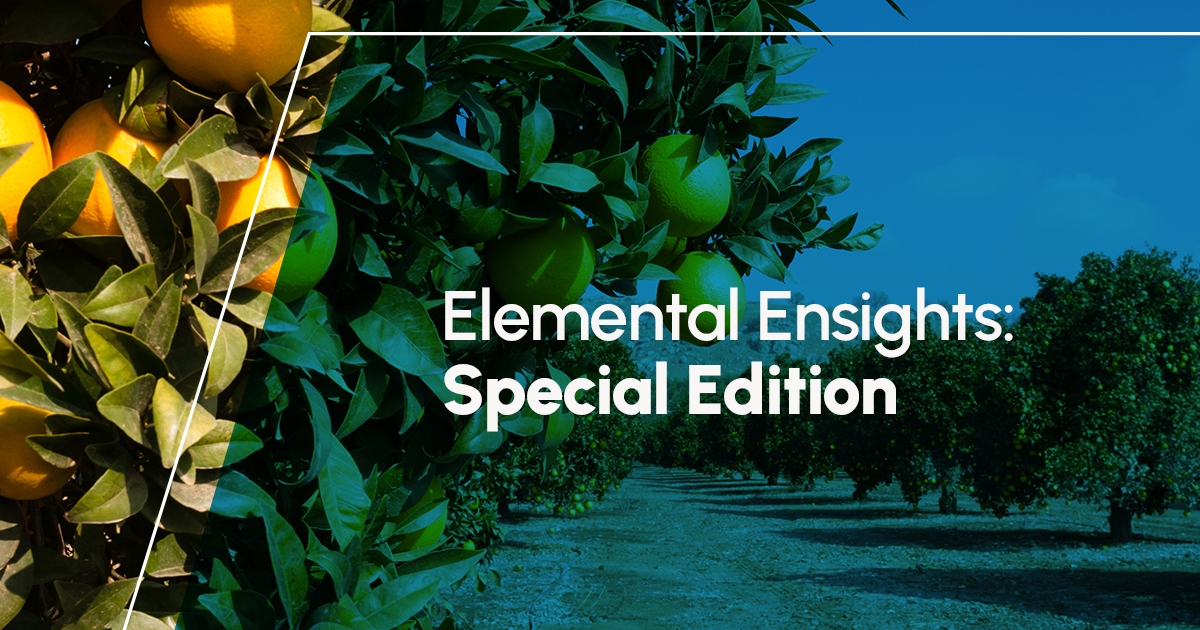
Creating a ‘softer footprint’ for crop inputs

Elemental Enzymes turning the peptide on plant disease
Convincing farmers to trust a new type of product is rarely easy, especially when there’s something as vital as yield and quality on the line.
Guy Perriman was acutely aware of this when asking growers in Australia and New Zealand to apply Elemental’s soil enzyme formulations to their specialty-crop acres.
“There are plenty of biological type products coming into the market, so we focus on education around our products, and show why we’re different from everyone else,” said Perriman, who works in Melbourne, Australia, as Elemental Enzymes’s Director for Asia-Pacific and European, Middle East, and Africa regions.

Elemental has field-trialed soil fertilizer bio-additives for specialty crops, including potatoes, onions, carrots, tomatoes, almonds, and more. These products employ Elemental’s patented technologies to stabilize naturally occurring enzymes that may break down stubble on soil or prime the soil for plant roots to absorb nutrients better and faster.
Perriman said Elemental typically starts with setting yield increase and quality improvement as its goalposts for testing products, and also delves into microbial testing of the soil before and after to show its impressive soil health improvement gains.
Farmers have found the results “quite pleasantly surprising” so far.
At one multigeneration farm in South Australia where the soil had been intensively farmed for potatoes for more than 40 years, Perriman said the grower saw up to a 30% yield increase after using one of Elemental’s patented liquid enzyme fertilizer additives in clay loam soils along with their standard crop nutrition program.
At another farm in Western Australia, where the soil is sandier, a carrot crop’s yield increase earned the farmer an additional 3-4T, or $3,000-$4,000 AUD per hectare.
And in Queensland, a farmer growing a large area of broccoli wanted something that would help break down cover crop stubble. An enzyme additive gave them better machinery-planting access, which resulted in a $5,000 AUD/ha. increase in yield.
From Fertilizer Efficiency to Disease Resistance
On the other side of the world, Elemental Enzymes U.S. Field Research Lead – Specialty Crops – West Brett Wahle said the company has conducted specialty crop trials differently in the United States.

He said the focus in the U.S. has been more on formulations that provide disease resistance for a wide variety of specialty crops — including almonds, pistachios, and walnuts in California; tomatoes and citrus in Florida; apples in Washington and New York; and leafy greens and lettuce in California, Texas, and Arizona.
Peptides — short chains of amino acids that, like enzymes, are naturally occurring — are Elemental’s superhero in combating crop disease. Peptides applied in a mixture or applied alone as part of an IPM program helps amplify the crop’s own disease resistance. Some of the diseases against which Wahle has seen significant decreases in infection using Elemental’s additives are almond blossom blight, pistachio alternaria late blight, and powdery mildew on grapes, tomatoes, apples, and other crops.
Elemental Enzymes is starting to expand into testing on more traditional orchard crops and has also conducted trials in parts of the Asia-Pacific region — including on hydroponic crops, and Chinese cabbage and other greens in South Korea. It has expanded trials into tropical zones to amplify the growth of avocados, mangos, macadamias, pineapples, bananas, and more.
Sustainability for Earth — and Farm Systems
In the U.S. and around the world, Wahle said there are conventional, sometimes synthetic, fertilizers, fungicides, and pesticides that are very effective for the crop but harsh on the environment. Then there are companies that manufacture bio-friendly products that are environmentally safe — but minimally effective.
Elemental’s products are naturally biodegradable, but also extremely effective on their own or mixed with other manufacturers’ applications. It’s the best of both worlds for farmers who may not be able, or want, to switch to an organic operation but do want to soften their environmental footprint while still meeting (or exceeding!) conventional-crop yield targets. Elemental products are designed to require less volume of conventional fertilizers and pesticides to do the same work.
“In this way, you get that sustainability,” Wahle said, “which yes, is a buzzword — but it does have some meaning on-the-ground in everyday use.”
He added Elemental researchers formulate products to be both effective and hardy enough to stand up to transport, storage, and blending/application needs in all production systems, so nearly any farmer can easily use them without making major changes to their routine.
He sees both sustainability and practicality in growers adding Elemental products to their existing lineup of fertilizers and pesticides. “In terms of soil health, you will actually make more money longer-term while treating the environment better. This is really impressive technology — created from naturally occurring compounds.”
And, Perriman explained, these formulations tick off all the boxes to contribute to a healthy food production system while fitting neatly into almost any producer’s existing farming system.
“I’m pretty proud when I put on an Elemental Enzymes shirt to go talk to people about what our products are, and see where the conversation goes.”




